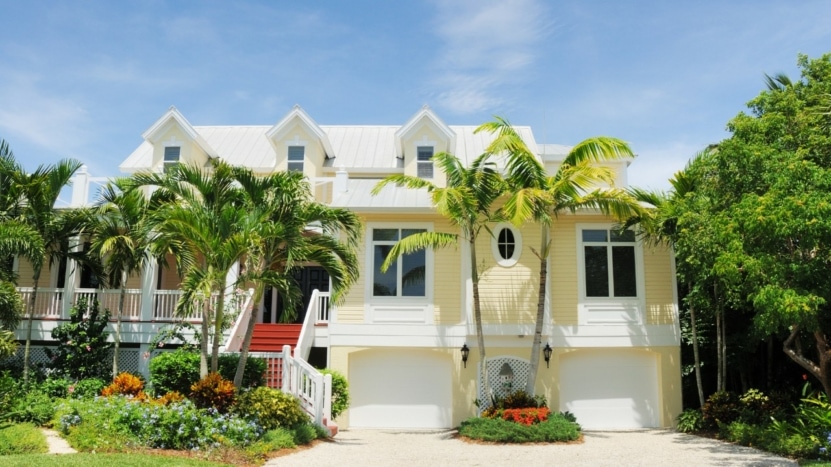Florida, known for its sunny beaches and vibrant lifestyle, is a top destination for vacation home buyers. Buying a home in Florida, whether it’s a beachside retreat or a cozy spot inland, is an exciting experience. We’ll guide you through the process of purchasing a home, offering helpful tips and information for anyone looking to buy a vacation home in Florida.
Why Choose Florida?
Florida offers everything from lively cities to peaceful beaches, suiting all kinds of tastes. Its wonderful weather and rich mix of culture and fun activities make it a great place for a vacation home. Plus, Florida’s booming real estate market is great for earning rental income and long-term investment.
Understanding Vacation Home Loans in Florida
The financing options for vacation properties are different from acquiring a primary home. These loan requirements often include a higher down payment and a good credit score. It’s important to understand vacation home mortgage loan options and rates. JVM Lending provides expertise in navigating home loans for vacation homes, ensuring you find a loan that fits your financial situation.
View mortgage rates for April 27, 2024
Is There a Difference Between Vacation Homes and Second Homes?
When diving into the Florida real estate market, it’s important to grasp the distinctions between vacation homes and second homes, as this can significantly influence your purchase and financing decisions.
Vacation Homes are typically acquired for leisure and enjoyment during specific times of the year, often situated in Florida’s popular tourist spots like beachfronts or near theme parks. They have the dual benefit of being a personal retreat and a potential source of rental income when not in personal use, offering the charm of a tropical getaway.
Second Homes, in contrast, are generally intended as a secondary residence, perhaps a place to spend a considerable part of the year, like a winter home in Florida to avoid colder climates. Unlike vacation homes, second homes are more centered on personal use and are less likely to be rented out, often located in more residential areas, providing a homelier feel.
Financing Differences are notable between the two. Loans for vacation homes might come with different criteria and interest rates compared to those for second homes. Lenders take into account factors like your capability to manage multiple properties, your debt-to-income ratio, and your overarching financial strategy.
Insurance and Tax Implications also differ. Vacation homes, especially those that are rented out, may require more comprehensive liability coverage, and there are distinct tax considerations for owning and renting out a vacation home compared to a second home.
With JVM Lending, you can gain clarity on these differences, ensuring an informed choice. Whether it’s selecting a vacation home for rental investment or a second home for personal use, our expertise can guide you through the intricacies, aligning your choice with your lifestyle preferences and financial objectives.
Are Vacation Homes Investment Properties?
Vacation homes can be considered investment properties, but this largely depends on how you use them and your intentions for the property. Here’s a closer look at how vacation homes can function as investments:
- Rental Income Potential: If you rent out your vacation home for part of the year, it can generate income, thereby acting as an investment property. Florida, with its high tourist demand, can be particularly lucrative for vacation home rentals.
- Appreciation in Property Value: Over time, the value of your vacation home may increase, especially in sought-after locations in Florida. This appreciation in value can make your vacation home a good long-term investment.
- Tax Implications: The way you use your vacation home impacts your tax situation. If you rent it out for more than a certain number of days a year (typically 14 days or more), the IRS considers it a rental property, which can have different tax implications compared to a property used solely as a personal vacation home.
- Personal Enjoyment with Investment Benefits: Unlike traditional investment properties, a vacation home offers personal enjoyment and relaxation benefits. This dual-purpose use can make them a unique and appealing investment choice.
- Consideration of Expenses: It’s important to consider all costs associated with owning a vacation home, such as maintenance, property management, insurance, and mortgage payments. These expenses must be managed effectively for the property to be a successful investment.
- Market Fluctuations: Like any real estate investment, vacation homes are subject to market fluctuations. The value and rental income potential can vary based on economic conditions, tourism trends, and other factors.
So while vacation homes can be considered investment properties, particularly when used to generate rental income or when they appreciate in value, they differ from traditional investment properties because of their personal use component. Prospective buyers should carefully consider their goals, financial situation, and the responsibilities that come with owning a vacation home as an investment.
The Process of Buying a Vacation Home in Florida
The homebuying process begins with determining your budget and understanding the costs involved, including monthly mortgage payments and closing costs. Partnering with a knowledgeable real estate agent and a reliable mortgage lender is essential. They can guide you through the complexities of the market, from selecting the right property to understanding home mortgage rates.
Vacation Home Loan Requirements
When looking to finance a vacation home, it’s important to be aware of the specific loan requirements. These criteria differ from standard home loans and are essential to consider for successful financing:
- Minimum Down Payment: A minimum of 10% down payment is required.
- Interest Rates: Rates are comparable to those for investment property loans.
- No Rental Income for Qualification: You cannot use potential rental income from the property to qualify for the loan.
- Full Payment Qualification: Borrowers must qualify for the entire mortgage payment without rental income consideration.
- Property Type Limitation: Only applicable to one-unit homes such as single-family residences, condos, and townhomes; multi-unit properties are not eligible.
- Advantage of Lower Down Payment: The primary benefit is the lower down payment requirement compared to many investment property loans.
Maximizing Your Investment: Renting Out Your Florida Vacation Home
In Florida, many vacation home owners choose to rent out their properties when they’re not using them. This strategy can help cover the costs and might even lead to a profit. When planning to rent out your vacation home, it’s important to think about its location and the amenities that could attract renters.
Pros and Cons
Pros:
- Potential Rental Income: Renting out the property can provide a steady source of income.
- Long-Term Appreciation: Property values in Florida may increase over time, offering a good return on investment.
- Personal Vacation Retreat: Offers a personal getaway spot for relaxation and enjoyment.
Cons:
- Additional Responsibilities: Involves tasks like regular maintenance and property management.
- Higher Monthly Payments: Can incur higher costs compared to owning just a primary residence.
- Financial Planning: Requires careful financial planning and consultation with professionals like JVM Lending to manage the additional expenses effectively.
Financial Considerations: Budgeting for Your Florida Vacation Home
When purchasing a vacation home in Florida, it’s crucial to look beyond the initial purchase price and consider the ongoing costs associated with owning the property. These expenses include property taxes, insurance, maintenance, and regular monthly payments.
Additionally, assessing your debt-to-income ratio is essential to ensure that you can comfortably afford a second home without financial strain. JVM Lending offers expertise in evaluating these financial factors and can help find a mortgage solution that aligns with your financial goals and circumstances.
Navigating the Florida Real Estate Market with Expert Assistance
Working with an experienced, local real estate agent and a mortgage lender is crucial when buying a Florida vacation home. A real estate agent, especially one with local knowledge, can be instrumental in helping you find the right property in your desired location.
Furthermore, your mortgage lender will offer invaluable assistance throughout the financing process. They can offer advice on vacation home loan rates, various loan options, and guide you through the application process. The expertise of these professionals can significantly simplify your journey, ensuring a smoother and more informed buying experience.
Finalizing Your Vacation Home Purchase: What to Expect
After selecting your property, the final steps in the purchasing process include undergoing a home inspection, finalizing your loan, and proceeding to closing. It’s important to be prepared for the closing costs and to ensure that you have all the necessary documentation in place.
Frequently Asked Questions
- Is buying a vacation home in Florida a good investment?
- Yes, Florida’s vacation homes can offer both personal enjoyment and investment potential, especially in popular tourist areas.
- What are the key factors to consider when choosing a location for a vacation home in Florida?
- Consider factors like proximity to attractions, potential for rental income, and the community’s lifestyle.
- How do I finance a vacation home in Florida?
- Explore various loan options, such as conventional loans or specialized vacation home loans. JVM Lending can help identify the best option for you.
- Can I rent out my Florida vacation home?
- Yes, many owners rent out their homes, but be sure to understand local regulations and tax implications.
Last Thoughts
Investing in a Florida vacation home offers a blend of personal enjoyment and financial opportunity. With JVM Lending’s expertise, you can navigate the process with confidence and ease. Reach out to us with any questions or if you need assistance at (855) 855-4491 or email [email protected].
From understanding home loans options to choosing the perfect location, we’re here to ensure your dream of owning a vacation home in Florida becomes a reality.
























